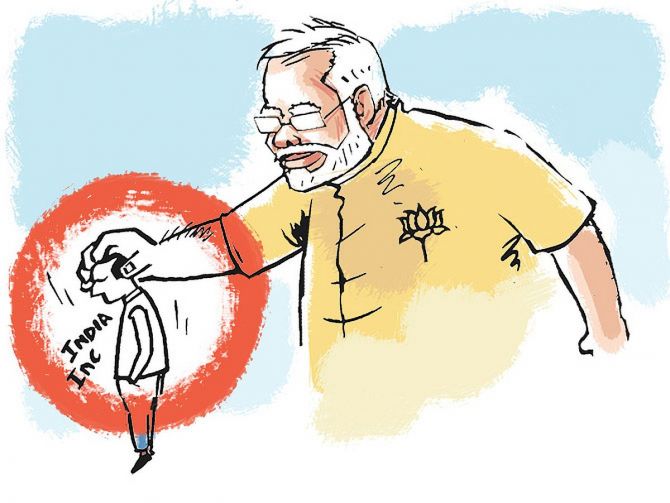As India's arbitration laws are disconnected from global best practices, global pension and insurance funds are more short-term in their investment outlook in India, operating through the stock markets instead of picking up long-term stakes in companies.
India does not recognise the jurisdiction of any foreign court in a commercial dispute that questions the state's sovereign power to intervene.

In the corporate battle for Mumbai airport, the Abu Dhabi Investment Authority (ADIA), the National Investment and Infrastructure Fund (NIIF), and Canada’s Public Sector Pension Investment Board (PSP) served a legal notice to the GVK group in August.
Their contention was that the 74 per cent stake sale in the airport to the Adani group would qualify as a breach of an agreement these investors had signed with GVK, the airport operator, last year.
Should there be a legal battle, which party has a stronger legal case is arguable.
But there should be no dispute about the jurisdiction of the court where those questions should be decided.
Yet, there is. ADIA, NIIF and PSP can approach any court in India up to the Supreme Court or an arbitration panel.
But if they choose to move a panel abroad and challenge the Indian government’s role (since the legal notice includes government-run banks), it becomes difficult for them to enforce an award should they win the case.
This is the same reason Vodafone International Holding BV, which owns 45 per cent of India’s mobile service provider, Vodafone Idea Limited, cannot enforce its recent victory in a 13-year tax arbitration case with India.
If Vodafone wants to enforce the terms of this ruling, it will have to approach the Indian courts - again.
That’s because India does not recognise the jurisdiction of any foreign court in a commercial dispute that questions the state’s sovereign power to intervene.
This is also why 70-odd Bilateral Investment Treaties (BIT) between foreign governments and India that have lapsed since 2016 are not being renewed.
India has amended those BITs by inserting a clause that tilts in favour of the Indian government.
Other countries have baulked at signing the new BIT because India offers a fair and equitable treatment (FET) standard that is unacceptable to most foreign investors.
Incidentally, the move to make BITs stringent cuts across party lines - the draft was approved by former finance minister P Chidambaram and became India’s position under Arun Jaitley.
A BIT effectively gives a foreign investor the right to directly initiate arbitral proceeding against a state without approaching its own government.
In fact, a BIT was in operation between India and the Netherlands when the challenge to the Indian tax department’s demand for retrospective capital gains tax was made by Vodafone International after it acquired Hong Kong-based Hutchison Whampoa’s majority share in Essar Hutchison in 2007.
The BIT was and is part of the reason India joined the dispute at the Permanent Court of Arbitration at The Hague, the oldest such tribunal globally (established 1899).
The newer ones are in Singapore and London.
To keep alive the interest of commercial entities in the efficacy of the Hague tribunal, the Netherlands maintains an extensive network of BITs with nearly 100 countries.
Though India did join the arbitration in the Vodafone case, it reserved the right to give effect to the award.
This reservation by India has a history.
New Delhi operates under its domestic Arbitration and Conciliation Act of 1996, which it revised last year.
The Act does not recognise the global architecture of arbitration under the International Centre for Settlement of Investment Disputes (ICSID) convention to which more than 150 countries are signatories.
India is instead a member of the less stringent UNCITRAL (United Nations Commission on International Trade Law), also known as the New York Convention.
Here, too, India has signed on with caveats.
The most important of those is that arbitration awards will only apply where the disputes are considered a commercial relation under domestic law.
Significantly, India does not recognise the relationship between the tax department and assessees as a commercial relation.
Indian courts have upheld this logic.
A Constitution bench of the Supreme Court in State of West Bengal vs Keshoram Industries (2005) held that if the terms of an international treaty are inconsistent with domestic law, a court will not give effect to the treaty.
In 2012 - about five years after the tax dispute with Vodafone began - Parliament had passed a retrospective law on overseas deals involving Indian assets.
Explanation 5 of Section 9 of the Income Tax Act allowed the government to tax indirect transfers of an Indian capital asset even if the transaction was done as part of a sale by a foreign company.
The foreign arbitration award in the Vodafone case is, therefore, inconsistent with current Indian law.
The absence of BITs is one reason foreign investors in India prefer to route their money through the stock exchange or via private equity/venture capital investments.
When companies do come in through the foreign direct investment (FDI) route, they prefer safeguards.
One of those is the permission for 100 per cent FDI in the sector.
The other is by using a special purpose vehicle incorporated in Singapore.
The island nation is the only one with whom India has a mutually recognised arbitration route.
It was signed as part of the India-Singapore Comprehensive Economic Cooperation Agreement in 2005.
Foreign portfolio investors push the government to retract any treatment that breaks this cosy arrangement.
Finance Minister Nirmala Sitharaman had to change the tax laws to recognise that foreign portfolio investments organised as trusts will pay 15 per cent tax on their dividend income against a proposed 25 to 37 per cent.
Domestic investment trusts do not get this advantage.
This walk-back occurred this year when the government could use any additional money.
It is the price India pays for keeping its arbitration laws disconnected from global best practices.
It is also why global pension and insurance funds are more short-term in their investment outlook in India, operating through the stock markets instead of picking up long-term stakes in companies, say, in road construction or power generation.
Yet India needs long-term money for its National Investment Pipeline, a basket of projects of about Rs 100 trillion.
It is likely that foreign investment into them will come from market-linked investment vehicles such as InviT - the infrastructure investment trusts - or Reits - real estate investment vehicles where exit is possible.
By August those investments were already Rs 60,000-crore strong and growing.
The lessons from the Rs 22,000-crore Vodafone tax case with India have been learnt.











